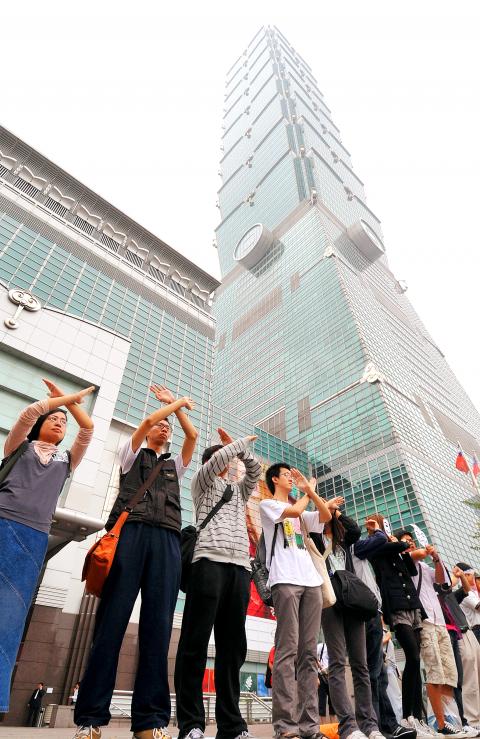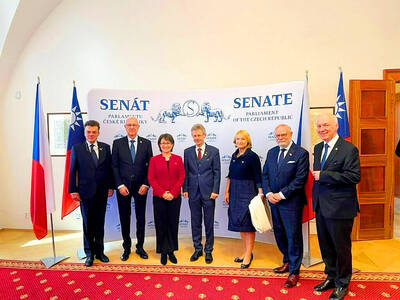Scuffles broke out between “Occupy Taipei” demonstrators, the police and Taipei 101 security staff when hundreds of demonstrators rushed into the Taipei 101 shopping mall chanting anti-capitalist slogans, as part of a globally coordinated movement against capitalism inspired by the “Occupy Wall Street” demonstration that started in New York City last month.
“No to capitalism! We are the 99 percent,” demonstrators chanted, while also singing the Workers’ Fight Song as they marched through the ground floor of the shopping mall in the country’s tallest building.
Before entering the building, demonstrators circled it, sparking minor physical and verbal clashes with security staff and the police who tried — unsuccessfully — to stop the protesters from entering.

Photo: Chien Jung-fong, Taipei Times
After their brief “march” inside the building, the demonstrators lay down and blocked the entrance of the building. Initiated by Internet users on Facebook, several hundred people showed up at the “Occupy Taipei” demonstration.
The protesters said Taipei 101 was chosen as the target because it is a landmark symbol of capitalism in Taiwan. Participants were mostly students, but also included office workers and unemployed and retired people.
National Taiwan University student Ho Shiang-kai (何翔凱) and friends edited and printed their own magazine, titled Socialist, that they sold during the demonstration, saying they hoped to spread different views.
“I’m glad to see a demonstration in Taipei that has no specific goals, but is directly targeting -capitalism and the financial system in the country,” he said, adding that the capitalist system is making the poor — especially young college graduates — work hard, while they don’t get much in return, and the wealthy make more money through investment activities.
“There are too many problems with capitalism, but I think, at least, the first step to creating a fairer society is to tax peoples’ income through investment activities,” he said. “It’s not fair that workers have to pay taxes on their hard-earned money, but the wealthy are exempt from taxation on whatever they earn from the money game.”
Liang Sheng-yueh (梁聖岳), a high school student from Hsinchu City who traveled to Taipei to take part in the demonstration, was also concerned about the widening wealth gap.
“The economic growth figures may look good on paper, but we are not feeling it because all the money is going into the hands of capitalists,” Liang said. “I don’t expect instant change to happen, but I hope that this demonstration can at least be a start for change in the future.”
A 63-year-old owner of a home design firm surnamed Shen (沈) said he was happy to see so many young people standing up against social inequality. However, he said he had expected that more people would have attended the protest.
A young woman, who only wished to be known as Zoe and was among the first group of people to initiate the event, said she was surprised to see so many people coming out yesterday.
“This shows that a lot of people are dissatisfied with current social conditions,” she said. “I wouldn’t say whether today’s [yesterday’s] action was a success or a failure, because this is only the start.”

FREEDOM OF NAVIGATION: The UK would continue to reinforce ties with Taiwan ‘in a wide range of areas’ as a part of a ‘strong unofficial relationship,’ a paper said The UK plans to conduct more freedom of navigation operations in the Taiwan Strait and the South China Sea, British Secretary of State for Foreign, Commonwealth and Development Affairs David Lammy told the British House of Commons on Tuesday. British Member of Parliament Desmond Swayne said that the Royal Navy’s HMS Spey had passed through the Taiwan Strait “in pursuit of vital international freedom of navigation in the South China Sea.” Swayne asked Lammy whether he agreed that it was “proper and lawful” to do so, and if the UK would continue to carry out similar operations. Lammy replied “yes” to both questions. The

Two US House of Representatives committees yesterday condemned China’s attempt to orchestrate a crash involving Vice President Hsiao Bi-khim’s (蕭美琴) car when she visited the Czech Republic last year as vice president-elect. Czech local media in March last year reported that a Chinese diplomat had run a red light while following Hsiao’s car from the airport, and Czech intelligence last week told local media that Chinese diplomats and agents had also planned to stage a demonstrative car collision. Hsiao on Saturday shared a Reuters news report on the incident through her account on social media platform X and wrote: “I

SHIFT PRIORITIES: The US should first help Taiwan respond to actions China is already taking, instead of focusing too heavily on deterring a large-scale invasion, an expert said US Air Force leaders on Thursday voiced concerns about the Chinese People’s Liberation Army’s (PLA) missile capabilities and its development of a “kill web,” and said that the US Department of Defense’s budget request for next year prioritizes bolstering defenses in the Indo-Pacific region due to the increasing threat posed by China. US experts said that a full-scale Chinese invasion of Taiwan is risky and unlikely, with Beijing more likely to pursue coercive tactics such as political warfare or blockades to achieve its goals. Senior air force and US Space Force leaders, including US Secretary of the Air Force Troy Meink and

Czech officials have confirmed that Chinese agents surveilled Vice President Hsiao Bi-khim (蕭美琴) during her visit to Prague in March 2024 and planned a collision with her car as part of an “unprecedented” provocation by Beijing in Europe. Czech Military Intelligence learned that their Chinese counterparts attempted to create conditions to carry out a demonstrative incident involving Hsiao, which “did not go beyond the preparation stage,” agency director Petr Bartovsky told Czech Radio in a report yesterday. In addition, a Chinese diplomat ran a red light to maintain surveillance of the Taiwanese